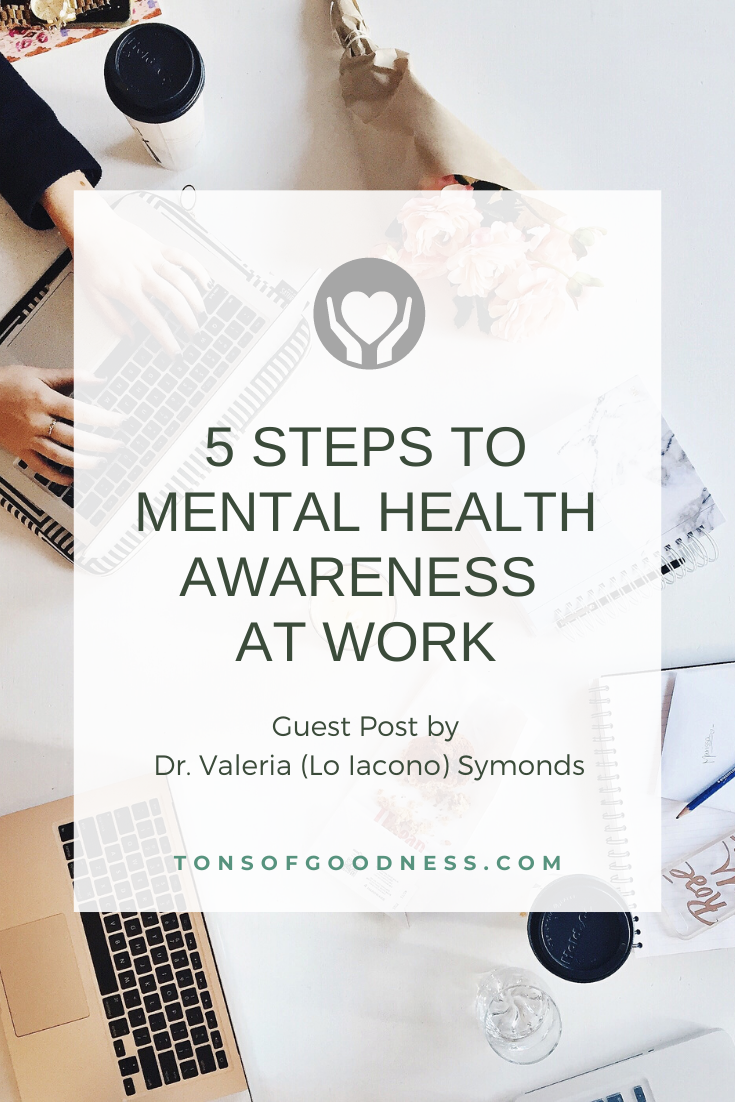

Disclosure: Some of the links in this article are affiliate links, which means that if you purchase through those links I will receive a small commission. For example, as Amazon Associate, I earn from qualifying purchases. If you decide to use these links, thank you!
Guest Post by Dr. Valeria (Lo Iacono) Symonds. Valeria provides training for Mindfulness in the Workplace. She has taught the social sciences at the University of Bath (UK) and Cardiff Metropolitan University (UK).
In recent years we have moved forward enormously when it comes to better understanding mental health in the workplace. I think a lot of people are much less afraid of seeking help for mental issues these days and there is less need to feel alone at work, when it comes to hidden illnesses.
In this post I focus on mental health awareness at work because the simple fact is that we spend so much of our time in the workplace and in the presence of so many others. Mental health awareness in the workplace can be broken down into two areas.
Firstly, being aware of our own mental health. And secondly, being aware, compassionate and helpful, to others who need help.
It is worth also stating that when we talk about mental health at work, that we are not just talking about severe bouts of depression and severe issues. For instance, you might suffer from unnecessary stress that leaves you with sleepless nights.

The problem though is that mild forms of stress can lead us towards deeper forms of mental health conditions and so being aware of ourselves and those around us at work, can be important. Mental illness is a continuum. In other words, it is a line whereby we can move up or down the scale in respect of how bad the illness is.
So what can we do in a simple daily way that will aid our awareness and begin to make even a small difference in at work? Let us look at five things that we can begin to do.
The first thing we can do at work is to gain a better understanding of the role colleagues who suffer mental issues play. Many such colleagues are often pre-judged and not given the empathy that they often need and this is a common remark by sufferers.
Research has shown that colleagues who suffer these issues tend to be as just as hard-working and even more loyal than other colleagues, for example. If you are a boss or manager, be aware that colleagues who suffer any type of disability, who are treated well by their company, tend to be extra-loyal to that company who show a high level of understanding.
Being aware also that mental illness is common, affects all genders equally, and that there things you can do to help, are example of awareness you can begin to have. Reading up on mental illness can help your understanding and it makes it far easier to be empathetic when helping colleagues in need of some help.
There are 3 main types of symptoms that those suffering will experience and these are physical, psychological and behavioral symptoms.
Taking the psychological signs, as an example. Loss of motivation, loss of humour, and the feeling of often being tearful, are just three of many psychological signs that you might hear or notice a colleague experiencing.
The key is to noticing key changes in behavior and how a colleague may act. Do they maybe need help and more understanding? This leads us into point three, speaking up.
One of the biggest reasons why many sufferers feel alone is because people do not speak up. Colleagues are afraid to get involved and hence often appear to the sufferer to lack compassion and empathy. There is also the concern over invading someone’s privacy.
On the other hand, as the sufferer, many people are afraid of being labelled stigmatized and being seen as weak. This of course is not true and these labels are less common with increasing awareness of mental health, but they can still exist.
If you see a colleague suffering, do not be afraid to ask them if they are okay, if you can do anything to help them, or just be someone who can listen to them.
Do ensure though that you ask the questions in a positive manner. For example, ask if there is anything you can do to help. Do not though state that you can see they are suffering and ask what is up with them. Be friendly and try and offer positive input and ask positive based questions.
If you are the owner of the business or at management level, you can also work to implement a caring environment for your work-force, where the right support exists. You may wish, for example, to provide mental health awareness training to all staff.
Likewise, you can ensure that managers at the very least, are trained to identify signs of mental health issues and trained to act with genuine empathy and understanding.
One big issue is that many managers are compassionate by nature, but that they simply feel uncomfortable and unsure of how to deal with disabilities in the workplace. This is often simply down to a lack of training.
The irony is that we often ignore our own mental health. Are you struggling to sleep at night because you worry about work too much? Do you dread going to work every day? Are you feeling down and isolated at work? Are you suffering in silence.
Do try and be aware of your own well-being at work and do not be afraid to ask for help. If you feel uncomfortable to talk with a manager or boss at work, there are numerous organizations you can contact (depending on your country of residence).
Your own GP (general practitioner) is a good person to contact if you feel you need further advice.

Dr. Valeria (Lo Iacono) Symonds provides training for Mindfulness in the workplace and mental health awareness at work. Valeria has taught the social sciences at the University of Bath (UK) and Cardiff Metropolitan University (UK) and finds her own relaxation through her love of dance